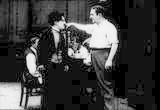| The Masquerader | |
|---|---|
 | |
| Directed by | Charlie Chaplin |
| Written by | Charlie Chaplin |
| Produced by | Mack Sennett |
| Starring | Charlie Chaplin Roscoe 'Fatty' Arbuckle Chester Conklin Charles Murray |
| Cinematography | Frank D. Williams |
Production company | |
| Distributed by | Mutual Film |
Release date |
|
Running time | 13 minutes |
| Country | United States |
| Languages | Silent English (Original titles) |
The Masquerader is a 1914 film written and directed by Charlie Chaplin during his time at Keystone Studios. This film stars Chaplin and Roscoe Arbuckle and has a running time of 13 minutes. It is the tenth film directed by Chaplin.